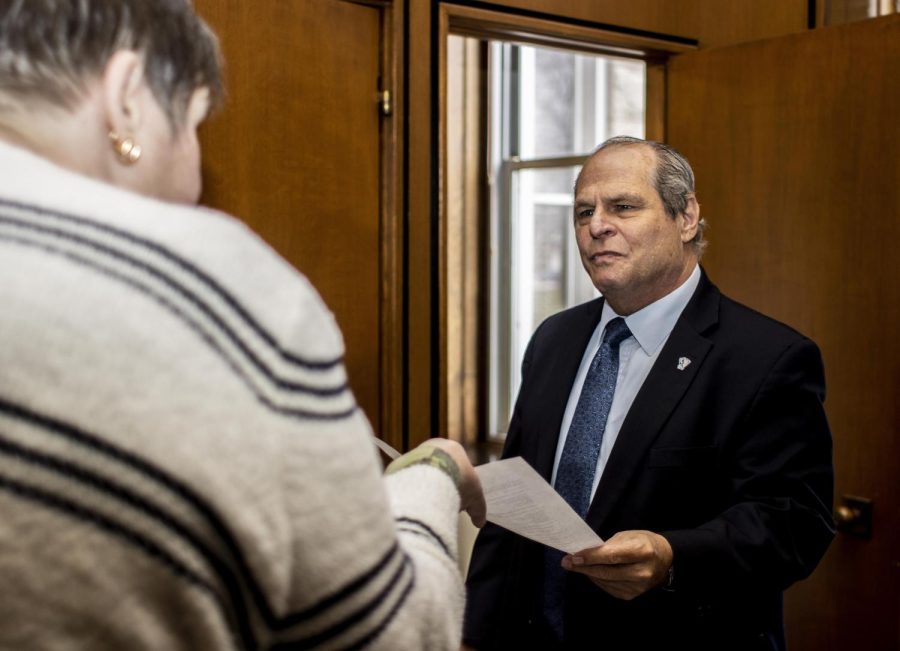EIU releases statement on potential union strike
Jennifer Stringfellow, the president of the EIU chapter of University Professionals of Illinois, hands President David Glassman a strike intention in his office at Old Main on Monday afternoon.
March 29, 2023
Eastern released a statement on the current ongoing union contract negotiations between administration and Eastern’s chapter of University Professionals of Illinois, EIU-UPI, on Monday.
EIU-UPI have been bargaining for a new faculty contract since March 21, 2022. They have been working without a contract since Aug. 31.
EIU-UPI represents roughly 450 employees on campus including professors, academic advisors, annually contracted faculty, the tenured and tenure-track faculty and academic support professionals.
Eastern and EIU-UPI have reached tentative agreements on numerous issues including parental leave, clarifying sabbatical language and others.
Currently, Eastern and EIU-UPI remain “far apart” on economics issues, according to the press release.
Eastern said EIU-UPI’s last economic proposal at the last bargaining session would cost Eastern approximately over $10M in total during the three years of the contract agreement from FY24 to FY26.
EIU-UPI has reported that the cost difference between Eastern’s proposal and the union’s is approximately $3M, according to a graphic released in February, making Eastern’s economic proposal cost over $6M.
Eastern currently is bargaining in “good faith” in an effort to meet what EIU-UPI is asking for while not increasing the costs for students at Eastern, according to the statement.
Provost and Vice President of Academic Affairs Jay Gatrell sent an email to students during spring break on March 13. Gatrell also mentioned the university wanting to meet the union’s demands, but keep tuition costs low.
Billy Hung, the lead negotiator for EIU-UPI and a biology professor, said paying faculty more does not mean student costs have to increase as a connected link.
“There is no law that says that increasing wages for some employees means they have to raise tuition,” Hung said. “It is also a choice that they make. They can budget differently. They can plan differently. They can prioritize differently. Those are all within their power to do.”
Hung also said the numbers being used in Eastern’s press release are not accurate to Eastern finances.
“The numbers in the press release contain obfuscation and misdirection,” Hung said. “They are not accurate representations of the financial reality of our school.”
Eastern said in the statement “The university’s current offer substantially exceeds the financial packages contained in prior collective bargaining agreements between the parties going back to 2010.”
Going back to 2010, the salary increases per year have been the following for Unit A faculty, according to past contracts:
- FY2010: 3.5 %
- FY2011: 1.5 %
- FY2012: 1.25 %
- FY2013: 1.5 %
- FY2014: 1.5 %
- FY2015: 1.5 %
- FY2016: 1.5 %
- FY2017: none – agreed deferral during state budget impasse
- FY2018: none – agreed deferral during state budget impasse
- FY2019: 1.5 %
- FY2020: 1.5 %
- FY2021: 1.75 %
- FY2022: 2 percent
Eastern’s proposal for salary increases in February for the next contract were 2 percent for FY23 (which began last fall) and FY24, FY25 and FY26 are all 1.5% with conditions, according to a graphic updating EIU-UPI members.
The conditions mean the 1.5% increase could be decreased to as low as 1 percent based on if state allocation reduces at all or increased above 1.5% depending on retention of first-time, full-time undergraduate students.
EIU-UPI’s current salary proposal is for 8 percent in FY23 and 5.5% for the three following years.
EIU-UPI have highlighted Eastern’s $9M surplus made from the FY22 to show the university could afford the additional over $3M the union is asking for in their contract proposal.
Eastern provided details of where the surplus came from in the press release.
The university reported $2M of the surplus was in funds specifically designated for non-academic purposes. $1.7M was the result from unfilled vacancies Eastern plans to fill.
Some of the surplus came from the unanticipated international student enrollment increase. A portion of the surplus resulted from the end of year state appropriation that was unable to be included in the FY22 budget, but will be used in the FY23 budget, according to the press release.
Eastern said all of the surplus has now been fully added into the FY23 budget to fund “non-negotiated salary adjustments, scholarships, expanded staffing and much needed deferred maintenance.”
Hung said a year ago when EIU-UPI brought up the $9M surplus in bargaining meetings and first presented their contract proposals, Eastern did not have any spending plans finalized for the funds yet.
“The administration was given our proposals in March of 2022,” Hung said. “The administration had all the time in the world to build the salary increase into their budget, but they chose not to. So when they say that the money has already been spent and budgeted for other purposes, and therefore not available, what they’re really saying is that they chose not to budget in a fair wage for our members. This is a post hoc after the fact justification for not paying us a fair wage.”
Hung said the current negotiations are over priorities and not money.
“This has been and continues to be a battle over priority and not the dollar amount,” Hung said. “The administration is trying to shift the focus away from that, but we’re not going to let them where they put their money is the choice that they make. They need to be held accountable for those choices. The union is focused on building our campus where we invest in the human capital. That makes our university wonderful. The administration can tell you what they are prioritizing on. But it isn’t the counselors, the advisors, the admission officers, the faculty nor the students.”
Upon request for additional details on the press release, Eastern declined to comment.
Madelyn Kidd can be reached at 581-2812 or at [email protected].




















































